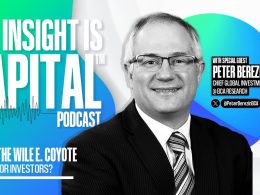by Russ Koesterich, Portfolio Manager, iShares
 In recent weeks, governments across the world have stepped up efforts to address the European debt crisis. Major central banks announced a coordinated effort last week to support Europe, while European finance ministers agreed on a way to enhance the region’s bailout fund and the European Union seemed on the verge of more fiscal integration.
In recent weeks, governments across the world have stepped up efforts to address the European debt crisis. Major central banks announced a coordinated effort last week to support Europe, while European finance ministers agreed on a way to enhance the region’s bailout fund and the European Union seemed on the verge of more fiscal integration.
Investors are now focused on the European Union summit happening in Brussels this week and what action, if any, the European Central Bank (ECB) will announce on Thursday.
To truly resolve the crisis, the ECB needs to find some face-saving way to expand its purchasing program, while the PIIGS countries need to implement necessary and difficult reforms. Major issues relating to European fiscal integration and the necessity to bring down Spanish and Italian bond yields also remain unresolved.
The future of Europe is uncertain, and I expect the crisis to continue into next year with at least a mild recession in Europe. But I believe European leaders will address the outstanding issues in time to avoid a sovereign debt collapse.
Still, a long-term European debt crisis is a valid concern and investors with such concerns should adjust their portfolios accordingly. If you expect the European debt crisis to drag on, here are four investing ideas to consider.
1. Within your international equity exposure, overweight CASSH countries. Investors looking for international developed market exposure may want to consider a long-term overweight to Canada, Australia, Singapore, Switzerland and Hong Kong — what I’m calling the CASSH countries. These smaller developed world countries appear fundamentally stronger than their larger counterparts. They have better growth prospects, less debt and less strained public finances.
2. Within your international equity exposure, overweight emerging markets outside of Europe. With the developed world the epicenter of the recent global sovereign debt crisis, emerging markets may provide a defensive play in the event of a continuing sovereign debt crisis. First, the emerging world has become more attractive than it was in the past. Many emerging markets now appear to be pictures of fiscal rectitude in comparison to Europe and other larger developed markets. In addition, I expect emerging market inflation to decelerate in 2012. Finally, over the last year, emerging market valuations have compressed in an absolute sense and relative to developed markets.
If the European crisis worsens into a severe banking crisis and recession, the impact of a global recession would be ubiquitous, and emerging markets do have exposure to European banks. According to the Economist, emerging markets owe Europe’s banks $3.4 trillion and such credit could be cut off in a banking crisis, potentially hurting emerging market economies in the longer term. Still, I expect the long-term impact of a worsening crisis to be less severe for emerging markets outside of Europe. Within emerging markets, I particularly like Brazil and Taiwan.
3.) Overweight “safe-haven” assets. A continuing European crisis would mean continued market volatility as investors react to each bit of news. As such, I continue to advocate adopting a defensive stance in equities, particularly through global mega caps and telecommunications. A continuing crisis would also favor gold, partly because it would likely mean continued negative real interest rates.
4.) Within fixed income, overweight investment grade and munis. Investment-grade bonds currently offer a rich yield relative to Treasuries and historically have lower default rates during recessions than high-yield bonds. Similarly, munis offer the potential for a rich, after-tax yield and dire predictions about the bonds have turned out to be unfounded. Both munis and investment-grade bonds also look cheap.
International investments may involve risk of capital loss from unfavorable fluctuation in currency values, from differences in generally accepted accounting principles or from economic or political instability in other nations. Emerging markets involve heightened risks related to the same factors as well as increased volatility and lower trading volume. Securities focusing on a single country and narrowly focused investments may be subject to higher volatility. Bonds and bond funds will decrease in value as interest rates rise. A portion of a municipal bond’s income may be subject to federal or state income taxes or the alternative minimum tax. Capital gains, if any, are subject to capital gains tax.












